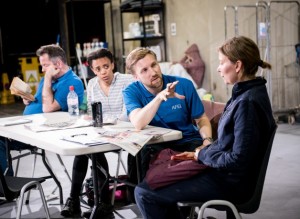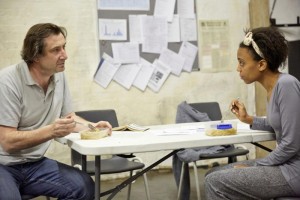Four people arrive to work the night shift in a meat factory. They meet for the first time. They are employed as cleaners by a temp agency. They are all on zero hours contracts. Every shift, they clean. Every four hours, they take a break. They drink tea or coffee together, read magazines, chat. As it gets light, they go home, or to another job. The cycle goes on. And on. Strangers. Until something stirs, until isolated people get too close to one another, too fast.
Beyond Caring has just finished a run at the National Theatre and is coming to Sheffield from 6-9 July at Moor Theatre Delicatessen. We talked to the play’s Director, Alexander Zeldin, to get the lowdown on this brutally honest and darkly humorous play.
Are you excited about bringing Beyond Caring to Sheffield?
We’re really excited about performing the play in Sheffield at the Moor Theatre Delicatessen because it’s a totally different venue from the others we’ve performed in. What’s important for us is that it’s going to be in the heart of the reality from which the show emerges – with shops closing, jobs changing and disappearing, and the landscape of what was employment disappearing and giving way to something much more precarious – and how that changes our relationships with each other and how we feel about the world. That’s what’s at the heart of the show.

How did Beyond Caring start?
I was originally asked to do something about the young unemployed with the Unicorn Theatre in London so I started to research that issue. Someone gave me a book about a woman who went undercover as a cleaner in Northern France which I found very moving because it described the lives of thousands of people going from one small job to the next. So I went and did the same thing, I did cleaning work in London and got a feeling for the environment. The big thing you’re looking for as a theatre-maker is how to create a theatrical event that will bring people together to think about the world we live in, in a fresh, original way. It can be difficult but I felt it was possible with this subject matter.
The play has been described in reviews as having a ‘social conscience’, how is this portrayed to the audience?
It’s a very moving subject and people can relate to it. There’s often a separation that exists in the way we talk about theatre between the head and the heart and I think that’s a mistake. I think everything is political, and it’s not possible to make something that isn’t political, especially in the midst of the current crisis. I think it’s irresponsible to not do political theatre. For me, I think it’s in the heart that the social conscience lies.
Has a director of any particular movement, naturalism or Brechtian theatre, inspired you?
I’m self-taught and I don’t think there’s such a thing as a method in theatre. Brecht wrote something about the theatre and Stanislavski wrote a system down but there are so many other people who never wrote anything down. I’m fortunate because I’ve been able to seek out experiences all over the world, I spent four months in Korea, I’ve done opera, I’ve learnt by doing. Theatre is a way of thinking about the world and it’s a tool for helping you to be alive and connected to other people.

Your rehearsals with the actors are immersive and collaborative, how do you think that style of rehearsal has impacted Beyond Caring?
It’s impacted massively and the play is credited as being written through devising with the actors. I’ve been working with two of the actors in Beyond Caring since they were eighteen years old and I’m passionate about developing actors and developing new kinds of actors so I always look to work with people from diverse backgrounds. I don’t do that for any political reason, I’m just curious about different types of people and experiences. Other people enrich you and you have every different point of view in the audience. The experience of watching a play is much richer if you’re watching it with lots of people, than if you’re on your own. Having a collaborative approach alters everything and makes it possible to create something truthful.
Was there a defining moment when you felt like the ensemble really clicked?
I think there’s a big misconception which people have and which I myself have had, that there’s such a thing as a solution in the theatre. I think that’s the opposite of how theatre works. In theatre you need to be open to the possibility of something almost unconscious. So there is no specific moment, everything is constantly in flow and always shifting.

And finally, do you have any funny rehearsal stories from Beyond Caring?
Yes, when we first started rehearsing the play, we had no money at all and we were at The Yard Theatre. We had to rehearse in a disused office in the theatre and there’s a moment in the play when one of the characters kicks a wall. During a rehearsal, the actor kicked the wall and her leg went straight through it, leaving a massive hole. Then she was on crutches for weeks. Not sure if that counts as a funny story, though!
Tickets: http://theatredelicatessen.co.uk/js_events/beyond-caring/
Interview by Erin Lawlor
Image 1: Graeme Braidwood
Images 2 & 3: Mark Douet
